There is a possibility that you are sleeping too much and you don’t know about it yet. Oversleeping or sleeping too long is the opposite of getting adequate sleep. Most of us are only aware of sleeping enough for good health. Is too much sleep a bad thing? When you exceed the average adult sleep duration, it becomes a problem. While insomnia gets all the blame, oversleeping can pose a risk to your health.
From oversleeping, your body can start showing various symptoms, such as obesity, heart diseases, and even diabetes. Anyone can oversleep but there are certain reasons that cause a person to oversleep. You can oversleep because of your poor sleeping habits like staying up late, irregular sleep schedule, overeating, or exercising prior to bedtime. Some other factors responsible for oversleeping are depression, anxiety, sickness, and medications.

Sleeping, which we know to have a myriad of benefits, when overdone could indicate an underlying disease. Therefore, you should find out if there is an underlying health condition causing you to sleep too much. Based on sleepfoundation.org, 5 to 9 hours of sleep is enough for most people. When stretched to 10 hours it is called oversleeping.
Sleep Foundation warns that sleeping past nine hours during a 24-hour cycle is a huge concern. If you have habituated oversleeping, you must practice “recovery sleep” to get over sleep deprivation. Recovery sleep is about finding the right balance in your sleep routine. Similarly, you must try to track your sleep patterns to stop oversleeping immediately. This blog will cover the causes, tips and tricks to overcome oversleeping.
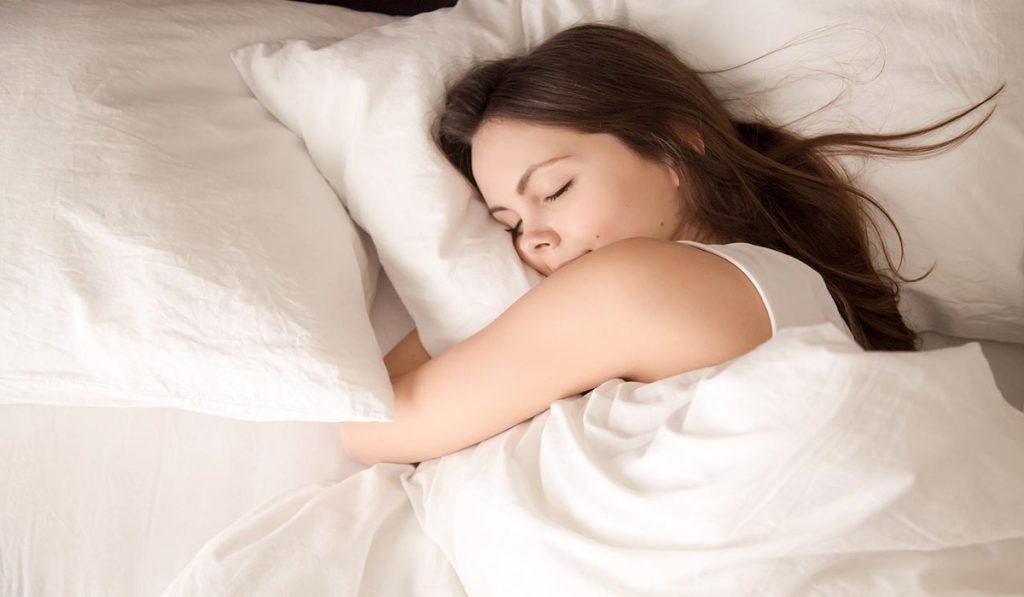
What Is Oversleeping?
Sleeping more than nine hours over the span of 24 hours is known as prolonged sleeping or oversleeping. The scientific term for excessive sleeping is Hypersomnia. In this condition, a person oversleeps and undergoes fatigue during the entire day.
The most common cause of it is Narcolepsy, which is a chronic sleep disorder. There are other types of sleep disorders that may cause someone to oversleep. Doctors refer to oversleeping as Excessive Quantity of Sleep(EQS). Through this term, doctors define oversleeping as a cause of distress in life.
When you cannot pinpoint the cause of your sleepiness, this is called Idiopathic Hypersomnia(IH). IH is a neuro-disorder that creates difficulty for a person to wake up, other than continuous drowsiness. Determining this disorder is very difficult and sometimes remains unknown. On average, doctors recommend sleeping for seven to nine hours and anything more than that becomes unhealthy.

Falling into a good sleep at night takes care of our wellness and promotes functionality of our brain. Not sleeping sufficiently can cause you lack of concentration and turn you lethargic. On the other hand, long sleeping can have a bad impact on your overall health.
From childhood to adulthood, the correct amount of night sleep is predetermined based on each individual’s daytime activities, sleep habits, and patterns. People involved in sports need more sleep than normal people, which should not exceed ten hours. Younger adults require as much sleep as older adults, which is seven to nine hours daily per night.
However, a younger person might go to bed late and wake up late as well, in contrast to their sleep habits in future years. Occasionally, you may need to sleep a little extra whenever you are involving yourself into any arduous physical activities.
If one extra hour of sleep can make your body feel the best, then that sleep amount is right for you. Even after sleeping for longer than usual if you doze off and feel tired, there is a chance of having any underlying disease.

What Causes Oversleeping?
There are a wide range of reasons that trigger a person to experience oversleeping. When trying to catch up on your lost sleep, you sleep more. The term for it is “sleep debt”. Although there is no problem in making up for the previous or next night’s sleep, sleeping like this regularly surely has. If you have been working late every night, your sleep routine is disrupted. To find some rest, you try to sleep on weekends to recover your “sleep debt”. Doctors think it’s normal for sometimes, but eventually if this turns into a habit, it won’t let go of you. Also, under certain conditions you might oversleep. Some of the recognized causes of oversleeping are as follows.
Drug & Alcohol Consumption
The use of drugs and alcohol can lead to oversleeping in most cases. Some types of drugs can affect more. Those are cocaine or amphetamine. Consuming alcohol causes more sleep and excessive tiredness in a person. Since both of them have sedatives that result in extreme drowsiness and longer sleep.

Lifestyle Factors
Certain lifestyle factors play a huge role in oversleeping. Some people who have a night shift job have to sleep in odd hours that makes them go beyond their usual waking time. The nature of their jobs lead them to go against the typical sleep cycle. A few jobs, like that of a caregiver, gives a limited time for sleep.
Sickness
Days when you have any illness, sleeping for more hours is quite normal. This is when your body needs more rest through sleeping than any other normal day. According to doctors and researchers, people with flu, respiratory infections, cold, or were affected by COVID are at risk of getting more sleep.
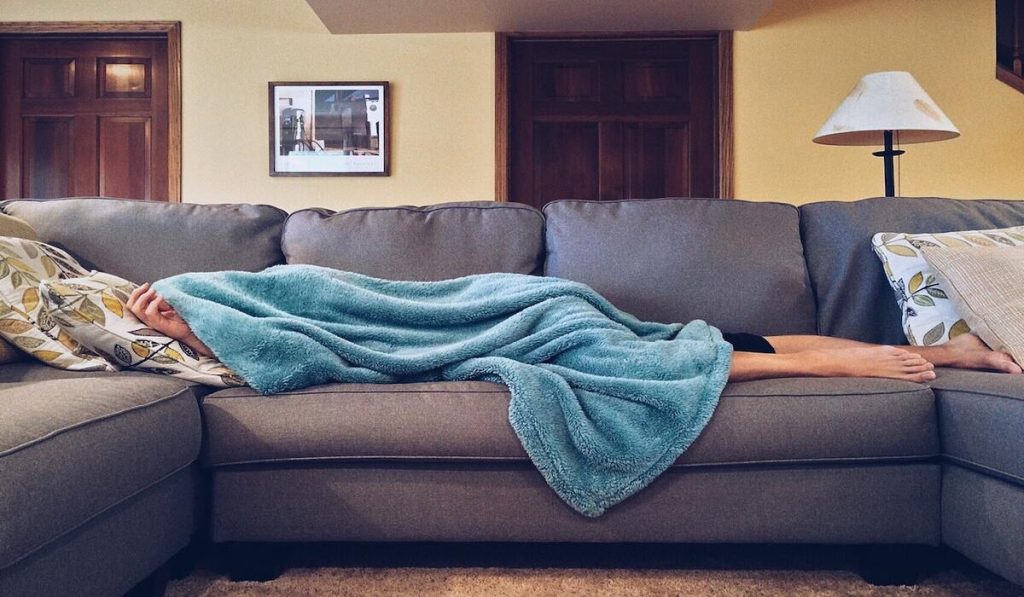
Sleep Deficit
Lack of sleep is another reason behind causing oversleeping. You may sleep more after you lose some sleep due to a hectic schedule. This can result in sleeping for longer periods in just a single day.
Medications
All of a sudden, you can start sleeping more because of certain medications. The medicines can make you feel drowsy all the time. This happens because they typically contain several sedating classes of drugs. Examples of such medications are sleeping pills, painkillers, antihistamines, tranquillizers, and some medicines related to mental disorders.

Physical & Psychological Conditions
Certain health conditions can affect you physically and psychologically which can later cause you to oversleep. Some health concerns like type-2 diabetes, hypothyroidism, cardiovascular diseases, chronic pain, obesity, and fibromyalgia. If you have any of these health conditions, it can get difficult for you not to fall back asleep.
Other Sleep Disorders
Along with the previously discussed sleep disorders, there are some others which cause oversleeping. Those causing extreme sleepiness include Obstructive Sleep Apnea(OSA), Restless Leg Syndrome(RLS), and Circadian Rhythm Sleep-Wake Disorders(CRSWDs). OSA is a breathing condition that comes in the form of snoring and breathing halts. RLS makes a person keep moving his legs because of continuous burning or tingling sensation. On the other hand, CRSWDs is a disorder about abnormal sleep-wake cycles that differs from the normal one.
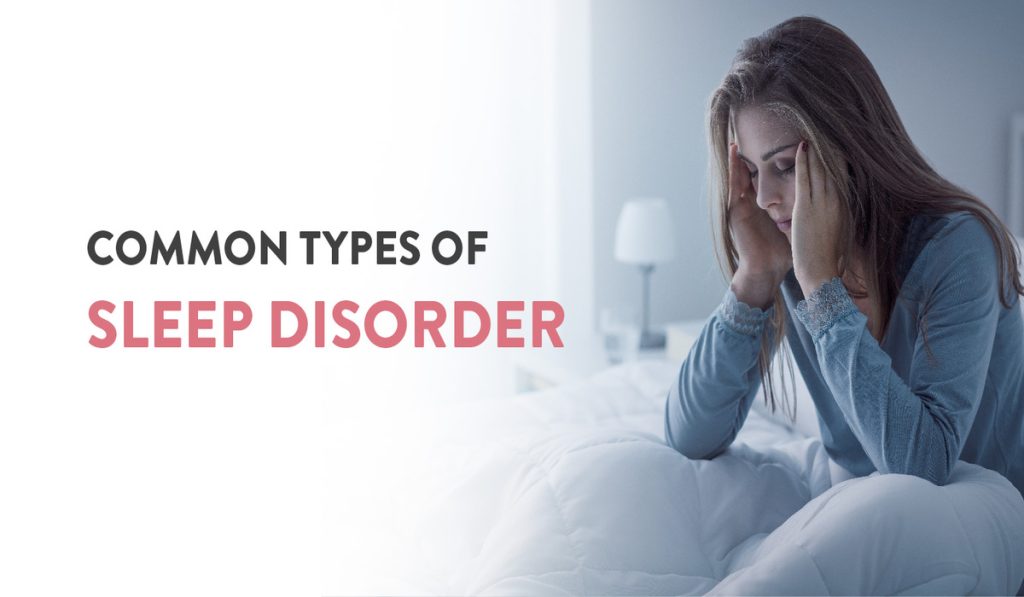
How Much Sleep Is Too Much Sleep? Risks Of Oversleeping
The amount of sleep varies from one individual to another. Generally, experts suggest getting seven to nine hours of sleep every night to wake up with a refreshed, relaxed body. If you are sleeping more than recommended hours of sleep for full rest, it is probably a sign of a medical problem. Thereby, you must go for an evaluation to a doctor to find out the underlying condition of oversleeping.
While oversleeping itself is a red flag, there are many signs you must look for. Once we know, sleeping less is associated with multiple health risks, similarly oversleeping regularly is harmful. Oversleeping can cause a person to develop low energy, fatigue, low immunity, mood swings, changes in stress hormones, and ultimately risks of death.
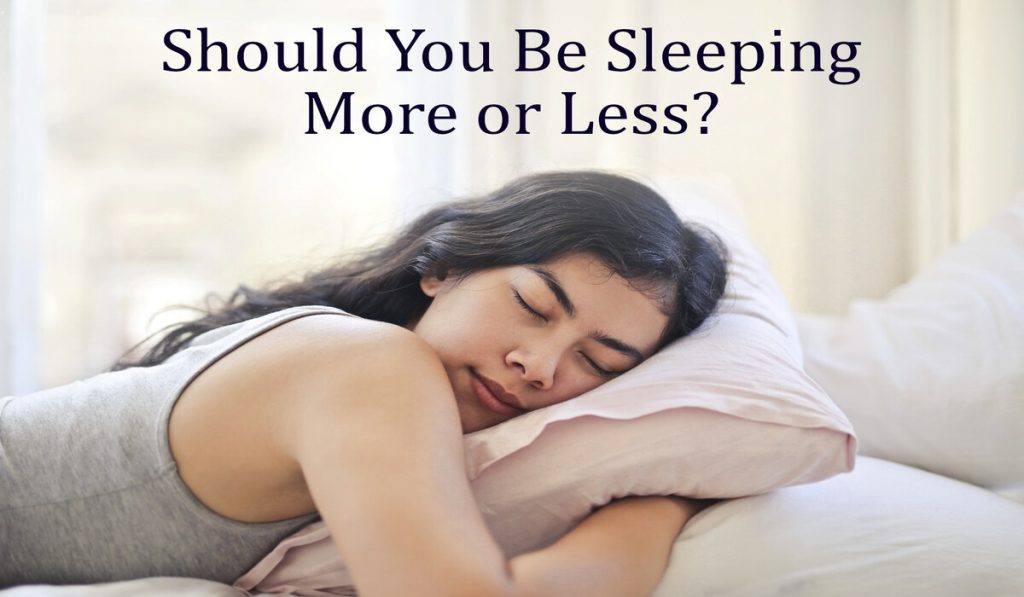
What Do Doctors Say About Oversleeping?
Getting more than enough sleep is detrimental to one’s health, as told by Dr. Cassie Majestic, a medicine specialist at the heart of California. There have been many studies which clearly show the risks prevails more in women. Women who sleep daily for 9 to 11 hours are at the verge of developing heart diseases.
Oversleeping is connected with anxiety and increased weight of the body. You can notice some visible changes in your body after regularly oversleeping. These changes can include frequent anxiety attacks, depression, weight gain, and so on. What else, sleeping continuously for longer hours is associated with a short lifespan.

There is even research having data from the last 50 years showing that both groups of people who sleep less and more have shortened their lifespans. She adds that oversleepers are more likely to have obesity, fatigue, hypertension, diabetes, and an inflamed system.
Sleep Hygiene Tips & Tricks: Ways To Manage Oversleeping
Sleep hygiene is the only way to get over oversleeping. Developing healthy sleep habits is important to sleep well at night. Most importantly, it will help you to take control of yourself to stop the perils of oversleeping. Let’s take a closer look at 8 sleep hygiene habits for ideal sleep habits.
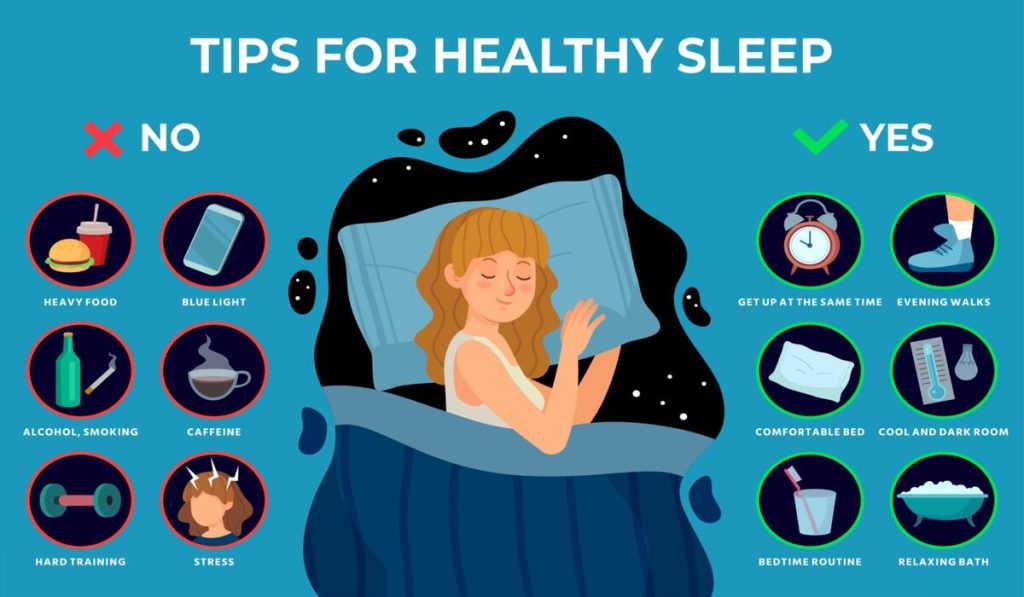
Create A Consistent Sleep Routine
Human bodies understand routine. Establishing a routine to sleeping and waking up at a certain time will train your body internally to have sleep on specified times. So, always try to hit your bed on time and wake up as soon as your internal clock rings. Even sticking to this routine on the weekend can help you to overcome bad sleep habits.
Sleep In A Calming Environment
To promote quality sleep, try sleeping in a comfortable bed and environment. This includes the mattress of your bed to the vibe of the room to room temperature. Make sure you sleep on a soft mattress that promotes rest. Also, ensure there is no noise coming into the room where you are sleeping.

Avoid Exposing Your Eyes To Lights & Screens
Never stay amidst bright lights a few minutes before going to sleep. Light exposure right before bedtime can disrupt our body’s 24-hour internal clock which is responsible for sleep and wake cycles. Such lights can also come from the screen of laptops, smartphones, TVs etc. Screentime at night dominates melatonin production in our body that increases hormonal activities and hampers sleep duration.
Regular Exercise During The Daytime Or Night
Exercising regularly can promote better sleep every night. You can start by aiming to exercise daily for 30 minutes. You can give some relaxation to your body through a pre-bedtime intense workout. This can last up to 3 hours. Just don’t do it right after finishing dinner. Make sure there is a good gap of 40 minutes between your dinner and exercise.
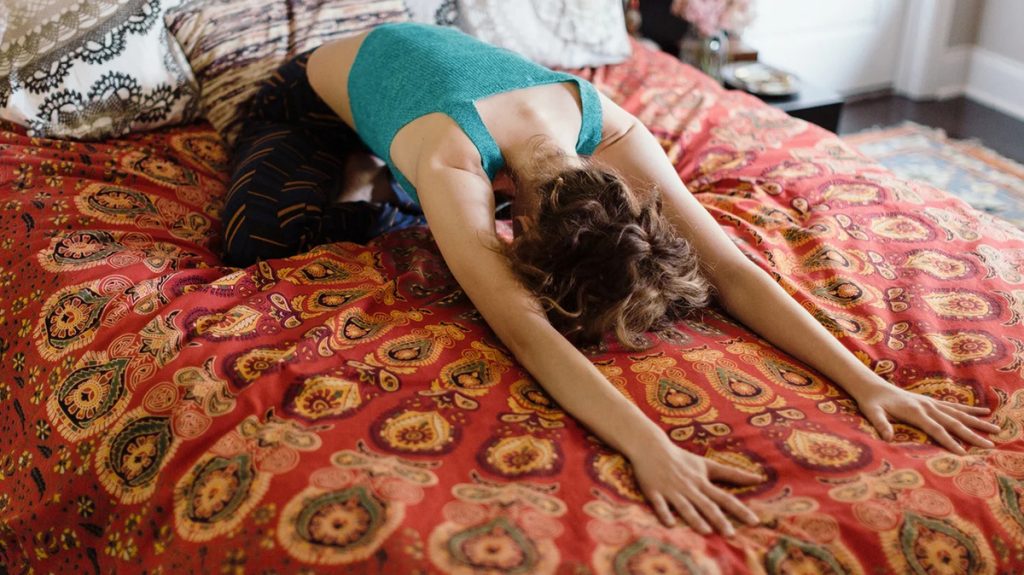
Restrict Caffeine & Alcohol Intake
The effects of caffeine stay up to three to seven hours a day after consumption. Drinking more cups of coffee means you will stay awake for a longer time. So, limit your coffee consumption so that you can go early in bed and wake up early too. The same goes for alcohol; both should be avoided in the afternoon and evening.
Soak Up Some Sunlight
To encourage your body to sleep, go outside to soak up the sunlight. During daytime, whenever you have a little time, expose your body to the sun rays to naturally balance your circadian rhythm.

Practice Meditation
As exercise helps the body to become active, meditation creates mindfulness. You will never feel sleepy once you incorporate meditation to your daily routine. This will help you to have a good sleeping pattern by calming down your mind. Practising meditation is very simple as it just takes 3 minutes to breathe in and out. While meditating for 5 to 10 minutes is enough, doing for 20 minutes is considered more impactful.
A Quick Overview On Oversleeping
Most people find themselves sleeping more in older age than they did in their younger days. But few researches mention the vice-versa. So, oversleeping can happen at any age that doesn’t always relate to age. As a young adult, if you are sleeping more than 9 hours and have no clue about the cause of oversleeping, you must check with a healthcare professional.
